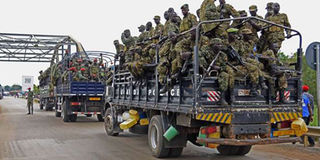We should ensure peace in S. Sudan in our time

Uganda military personnel drive towards Juba in South Sudan at Nimule border point on July 14, 2016. The Ugandan Army have started an evacuation mission to extract 3000 Ugandan civilians stranded by the recent fighting between army loyal to President Salva Kiir and first Vice-president Riek Machar. PHOTO | AFP
What you need to know:
- Salva Kiir and Riek Machar shared everything there was to share in government, including the right to retain their own militia instead of having one national defence force.
- The patched-up South Sudanese government was the proverbial camel derided as being a horse designed by committee.
- A government without full control of its territory, a unified system of defending its borders and a sustainable view of a united future, is not a government.
- Individual members of the militia will always be seeking to ‘live off the land’ as is the habit of such outfits.
Five years ago, South Sudan entered the community of independent nations as a proud self-governing African republic. A sense of optimism pervaded the region as a country that had not known peace for decades finally settled down to the onerous task of nation-building, bringing hope to the hundreds of thousands of refugees who had fled their country in worse times.
Many young South Sudanese had been born outside the country, and some returned to their ancestral roots for the first time after independence.
Unfortunately, conflict soon erupted over power sharing between two factions led by unrepentant warlords backed by ethnic militia. International mediators were required to hammer an agreement to ensure ‘peace in our time’, to paraphrase British Prime Minister Neville Chamberlain on the eve of the Second World War.
Reviewing the current structure of the South Sudanese government, one wonders how such an arrangement was meant to last for any length of time.
The two warlords shared everything there was to share in government, including the right to retain their own militia instead of having one national defence force. Within each faction one finds military generals controlling sections of their respective militia largely answerable only to themselves.
It should not have come as a surprise therefore that an alarmist social media post from one of the factions, indicating their leader was facing an imminent threat to his life, would trigger sudden conflict resulting in the deaths of hundreds of citizens.
One wonders what theory of government resulted in such a governing arrangement in a country emerging from war and hankering after a unifying leadership that would help the citizens to focus on rebuilding their broken lives and planning for the future of their offspring.
Quite clearly, the patched-up South Sudanese government was the proverbial camel derided as being a horse designed by committee. A government without full control of its territory, without a unified system of defending its borders, without a sustainable view of a united future, is not a government. Without accountability to anyone but themselves, the warlords will proceed to grab whatever comes their way, and use whatever surplus they have to appease their restless militia.
LIVELIHOODS DESTROYED
Individual members of the militia will always be seeking to ‘live off the land’ as is the habit of such outfits. In their wake they will leave many livelihoods destroyed, and many people maimed and killed for trivial reasons.
This is the reality of life in Juba, the South Sudanese capital. It is a modern-day Wild West where law and order are shape-shifting concepts whose present form is only defined by the one wielding the greatest firepower.
While a temporary ceasefire has been agreed at the time of writing this piece, it is clear that all is not well. The leader of the opposition faction has withdrawn from the capital to ‘await details of the ceasefire’, and even though his spokesman indicates they are not planning for war, similar retreats in the recent past have not ended well.
Unless outside influence is brought to bear in this situation, South Sudan is on the brink of yet another war. Here in Kenya, and other parts of Africa, we talk about South Sudan as if it is a special basket case whose circumstances bear no resemblance to our own.
Unfortunately, when one scratches the surface they find festering wounds just waiting for the opportune time to erupt. For a couple of decades under Siad Barre, nobody thought that Somalia could erupt so catastrophically after his exit. Today the country stands as a monument to the triumph of sectarianism over national unity.
We must learn lessons from the past and help establish institutions in South Sudan (and most of Africa!) that ensure the citizens enjoy the benefits of a free state and pursue their dreams without fearing that tomorrow they will be killed.
Atwoli is associate professor of psychiatry and dean, School of Medicine, Moi University; [email protected]





